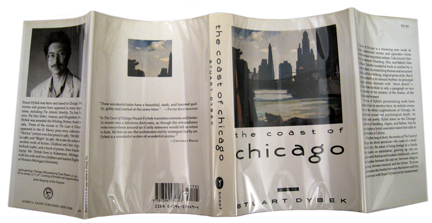


Stuart Dybek is one of the preeminent short story writers of our time. He often writes about life growing up in Chicago — stories everyone can relate to. His work has appeared in The Paris Review, The New Yorker, Ploughshares, Harper’s and numerous other publications. He’s also won several awards for his work including a PEN/Malamud Award and a Guggenheim. One of my favorites stories was one he wrote called “We Didn’t,” which was selected for The Best American Short Stories of 1994. Mr. Dybek was kind enough to answer a few questions about the process of writing.
What was your youth like, and what made you want to be a writer?
Dybek: My "youth" — I'm not sure what the boundaries of that are — is a subject I write a lot about. I grew up in an inner city Chicago neighborhood that is at the center of
the three books of fiction I've published. And I am still mining that material, and
when one has expanded the notion of youth and coming of age over so many years and
so many pages that makes it difficult to summarize in answer to the question. Let me in
a sentence say that it was a time when each day was filled with characters and
stories that, at the time, I didn't realize were anything other than living.
Where do your stories come from? How do you begin?
Dybek: Stories come from a variety of sources — experience, memory, stories I have been told, stories inspired by books I have read, movies, music, art. Since I have
chosen to write fiction my first allegiance even in stories based on experience is
to imagination. Often my stories begin with some image that has haunting power and
in trying to capture and explore the image, a story emerges.
What are your writing habits like? Are you always working?
Dybek: I try to write every day. I almost always write fiction to music. I keep
notebooks. I rewrite, rewrite, rewrite.
How much of what you write do you throw away?
Dybek: I have boxes of failed work, or work waiting for some spark, some juxtaposition
with an as yet unwritten piece. I don't throw much away because one never knows
when those juxtapositions might occur, only that they don't occur often enough.
How do you feel at the end of writing a story or novel?
Dybek: More than ready to move on to the next piece.
What is your writing space like?
Dybek: A separate room used only for writing: with a very good stereo and tons of the
music I write to.
What are you working on now?
Dybek: I have three manuscripts very close to being finished: a book of stories, a book of what is currently being called flash fiction, though I think of it as fragments (a term used
in France for short pieces) and a book of poems set in the Caribbean.
Stuart Dybek was born and raised in Chicago, Illinois. He writes about the neighborhoods he grew up in, and the various ethnic groups that surrounded his daily life. Dybek earned an MFA from the University of Iowa, and currently teaches at Northwestern University. He has written books of fiction and poetry, including Streets in Their Own Ink (poetry), Childhood and Other Neighborhoods (fiction), and The Coast of Chicago (fiction). His work appears regularly in magazines like Harper’s, The New Yorker, Tin House and Ploughshares. Dybek has also won numerous awards for his work, these include a PEN/Malamud Award, a Whiting Writers' Award, a Guggenheim, and several O. Henry Prizes. He is currently at work on several different projects.
ISSUE:
S P R I N G
2011
THE NEW
RULES OF
W R I T I N G
By accessing this site, you accept these Terms and Conditions.
Copyright © 2010-2011 TheWritingDisorder.com ™ — All rights reserved